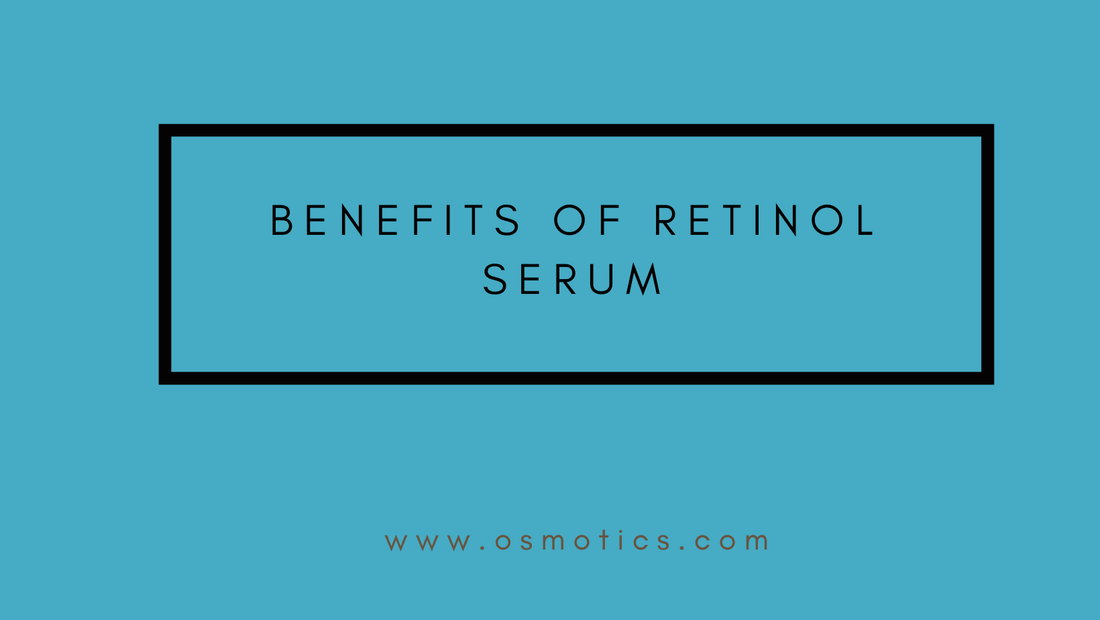
Benefits of Retinol Serum
Share
What is Retinol?
Retinol is a kind of vitamin A that has numerous applications in skin care. It treats acne and has anti-aging properties. You can purchase retinol without a prescription or speak with your healthcare professional about how retinol can best fit into your beauty routine. Your doctor may prescribe retinoids in stronger concentrations than those available over the counter. Retinol is a topical therapy, which means you apply it to your skin. Retinol is available in a variety of forms, including:
- Gels.
- Lotions.
- Serums.
- Creams
- Ointments.
Benefits of Retinol Serum
Reduce Acne
You did read that correctly. Retinol first got approval to treat acne in the 1970s. It promotes cell replacement and avoids pore obstruction. Both inflammatory and non-inflammatory acne can benefit from retinol, a potent acne therapy. It has been demonstrated to minimize the appearance of pimples on the skin and to slow the development of new blemishes and acne problems.
Using a retinol serum as part of your routine if you have acne will help to clean your skin and unclog your pores. Additionally, it interacts with the distinct retinol receptors found in skin cells to decrease oil synthesis in these cells. By avoiding oil from blocking your pores, decreased oil production aids in the prevention of acne.
Related Article : Simple Skincare Tips for Men
Retinol for dark spots
Your skin might get sun-damaged and acquire dark spots (hyperpigmentation). Your face, hands, neck, or arms may have light to dark brown patches that are caused by an accumulation of the pigment melanin, which gives your skin its color (pigment). These spots, which are also known as liver spots, age spots, and sun spots, are not painful, but there are surgeries and topical treatments that you can try if you don't like how they look. Although it can irritate your skin and takes months, some people find that topical retinol lightens their skin spots. If you're worried about dark spots, it's a good idea to visit a dermatologist (a medical professional who focuses on disorders of the skin).
Cost-Effective
Purchasing retinol may seem like an extravagance that you cannot afford, depending on your financial situation. Spending money on less expensive, temporary fixes, however, can turn out to be more expensive in the long run. One of the few chemicals, retinol, has advantages that science has shown, making it a sound investment for the future. The best retinol serum is available here at The Osmotics Skincare for only $80—a modest price to pay for benefits that are assured and clinically proven!
Controls Skin Hydration
A deep wrinkle retinol serum helps to balance out the natural hydration levels of your skin by preventing moisture loss through your pores. When your skin dries out too much, it produces too much oil to make up for the loss, which frequently leads to blemishes (especially if you got blemish prone skin). Retinol levels out all that hydration, causing your skin to create the ideal quantity of oils, which also prevents subsequent outbreaks.
Reverses And Protects From Free Radical DamageFree radical damage, including the effects of all the time you've spent in the sun without protection, is known to be repaired by retinol. Retinol serum's ability to combat free radicals and shield the skin from harm from pollution and other environmental factors is one of its strongest features.
Peels off The Skin
Retinol works as a gentle exfoliant on your skin, removing the top layer of dead skin cells while also balancing skin tone and smoothening texture. It's a win-win situation because other products also tend to work better on skin that has been exfoliated.
Can you use retinol while pregnant or breastfeeding?
Before using any new products, supplements, or prescriptions while you are pregnant or nursing, talk to your doctor.
Using topical retinoids while expecting
Retinoids, when used orally, can result in birth abnormalities. According to certain research, less medication that is applied to the skin gets absorbed and goes into your bloodstream. However, there are accounts of kids being born with birth abnormalities as a result of their birth parent's topical retinoid use. Healthcare professionals advise against using retinoids while you are pregnant because there are other ways to manage skin issues. If you take retinol creams, discuss birth control options with your doctor if you intend to get pregnant.
Topical retinol use and breastfeeding
Little topical retinoid enters your bloodstream because it is administered to the skin. Healthcare professionals think there is little risk to nursing infants. While nursing, you should always go over all medications and supplements, even topical ones, with your healthcare professional. If you choose to use topical retinoids, be careful not to massage the cream over your breasts and avoid getting any on your baby's skin.
How to Use Retinol for Acne
- Before including retinol into your regimen if you currently use any other topical anti-acne medications, speak with a dermatologist or plastic surgeon. Otherwise, your skin could get overwhelmed and irritated right away.
- Add retinol gradually to your routine. Retinol is no different from other active ingredients in that your skin takes some time to adjust. Particularly challenging might be the retinization procedure. Apply only every other night at first. After an hour or two, you might wish to wash the cream off if you have sensitive skin. A solid rule of thumb is that you should apply less the more irritated your skin is. If your skin reacts favorably, you can begin using retinol once per night.
Conclusion
Retinol can work wonders, but constant usage is necessary to observe benefits because they take time to manifest. After using retinol, your skin could get softer, smoother, and more radiant. Increasing collagen production will help reduce wrinkles and fine lines. Retinol is a prominent active component in several skin care treatments.
